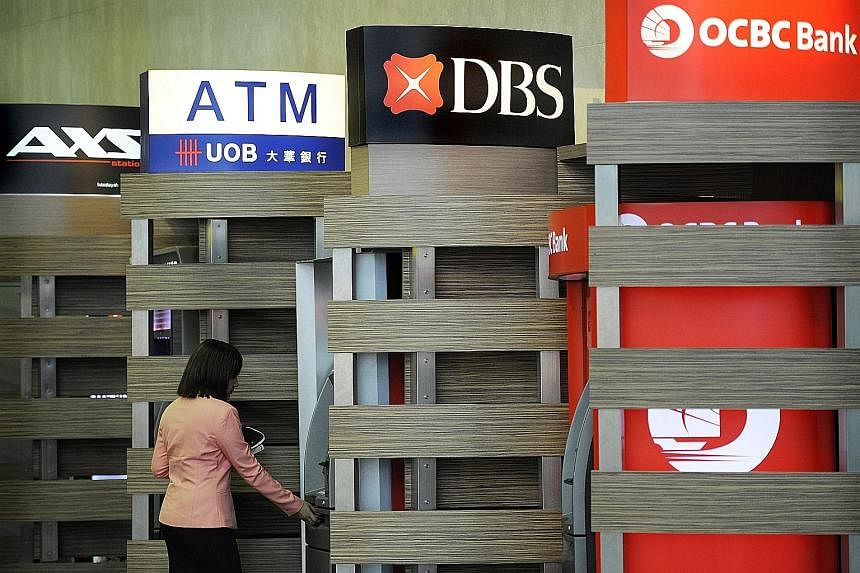Singapore banks look set to weather the choppy market conditions ahead quite comfortably.
Analysts say banks here will benefit from the looming interest rate hike in the United States, while their robust fundamentals continue to buffer them against headwinds.
Greece's deepening debt crisis and its potential exit from the euro zone have raised fears of a financial market crash in this region, where economic slowdown is also adding to the downside for banks.
But experts looking at the prospects of DBS Group Holdings, OCBC Bank and United Overseas Bank are not worried, with CIMB analyst Kenneth Ng shrugging off the notion that the Greek crisis may have a major impact on local banks.
"In previous crises, Singapore banks' exposure to contagion effect included collateralised debt obligations for DBS in 2008 and Europe fixed-income bank debt for UOB in 2011," he said.
Those debt obligations were at the heart of the United States sub-prime mortgage crisis preceding the global financial crisis.
"We believe that the banks have learnt their lesson and have cut off all risky securities holdings… Singapore banks did not have PIIGS (Portugal, Italy, Ireland, Greece, Spain) debt in 2011 and are unlikely to have added any in the interim," Mr Ng said in a note last week.
It also helps that all three local banks are extremely well capitalised by global standards. At the end of the first quarter, the common equity tier 1 capital adequacy ratio - a gauge of a bank's core capital strength - was at 13.4 per cent for DBS, 13.5 per cent for OCBC and 14.3 per cent for UOB.
These are significantly above the minimum requirement of a global standard known as Basel III of 6.5 per cent, and higher than the 11 per cent of most global banks.
But the trio are not just in defensive mode. As the Federal Reserve prepares to hike up interest rates later this year, the performance of the local banks may benefit from better margins.
The three-month Singapore interbank offered rate (Sibor), which traditionally has a strong correlation with Fed rates, has weakened from its multi-year high in April to 0.82246 per cent, but it is still more than double the 0.4 per cent level in at least the past four years.
An improvement in the US job market last month has again made September a probable start date for US rate hikes.
And as Sibor rises in tandem - potentially by 25 basis points this year, according to Credit Suisse and Standard Chartered forecasts - the squeeze on local banks' net interest margin will ease to give them a better loan spread in the second half of this year.
For DBS, a Sibor of around 0.6 per cent to 0.7 per cent would already have given the bank's earnings a boost of $150 million this year, its chief executive, Mr Piyush Gupta, calculated in February.
The upside will more than offset the drag of slowing loan growth, where total bank lending had dropped month on month since February before a 0.5 per cent rise in May, the Monetary Authority of Singapore announced last week.
"We believe the Singapore banks can deliver a strong performance, despite slower loan growth, because sustained higher interest rates lead to a positive operating leverage," Nomura analyst Jaj Singh said. "We expect credit costs to rise, but the increase may not be significant as the rise in specific provisioning could be offset by lower collective provisioning."
In the non-interest and fee income segment, local banks will also continue to reap benefits from their concentrated efforts to build cross-border franchises, particularly in wealth management and transaction banking businesses.
In the first quarter, non-interest income rose by 9 per cent year on year to $1.05 billion at DBS, the first time it has passed the billion-dollar mark. At OCBC, it was up 7 per cent year on year to $859 million, while UOB reported a 10.7 per cent gain to $755 million.
Further business growth is on the cards for the three banks, even in the trying times ahead, CIMB's Mr Ng believes.
"On the fee income front, wealth management and treasury are key drivers. While the wealth management business may suffer a bit as markets crash, volatility generally creates an environment for more treasury profits as clients hedge more," he noted.
DBS will announce its second-quarter results on July 27, while OCBC and UOB will both do so on July 31.


